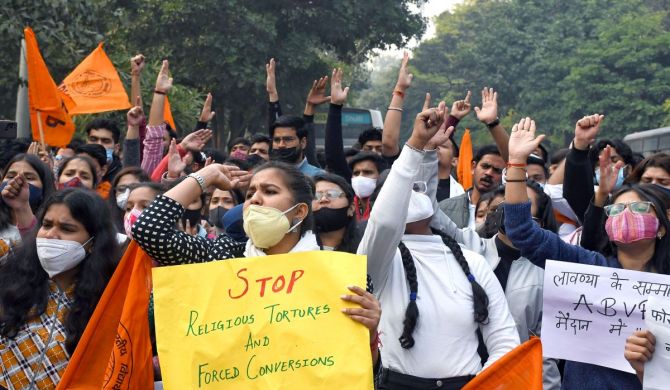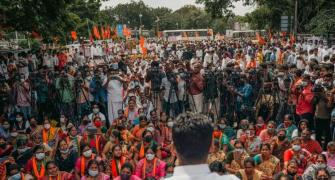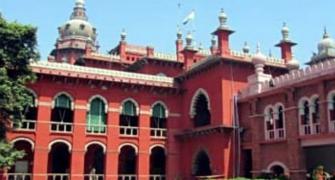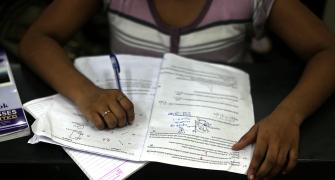As of now, there is nothing to suggest that the 'Michaelpatti episode' has the potential to polarise Dravidian Tamil Nadu on religious lines, observes N Sathiya Moorthy.

A single judge of the Madras high court bench at Madurai, G R Swaminathan, has ordered a Central Bureau of Investigation probe, slowing down the pace of a raging political controversy over the suicide of Lavanya, 17. However, there is no telling if it will end there.
The row is over contradicting videos passing for the school girl's dying declaration on allegations that the hostel warden at her Christian missionary school at Michaelpatti in Thanjavur district of Tamil Nadu, attempted forced conversion. But it is also about which version is genuine and which could be accepted under the law.
According to thus far uncontested reports, Lavanya consumed farm chemicals while in the school hostel, held back the information from both school and parents after returning home. Only in the government hospital where she was taken after she vomited again, did doctors suspect more than an ordinary stomach upset -- and Lavanya talked.
State Bharatiya Janata Party President K Annamalai was the first to publicise what could have passed off for yet another case of suicide, by releasing Lavanya's video from her hospital bed, where she responds to queries that hostel warden Sister Sahaya Mary, 62, had asked her to convert to Christianity, about two years ago.
A couple of days later, there appeared another video where Lavanya, again from her hospital bed, was blaming it all on her stepmother, who kept her aloof whenever at home, owing to patches of pale-skin attributed to leukoderma.
In between, there was Lavanya's police statement. There was also her '164 statement', made to a judicial magistrate, under the said section of the Criminal Procedure Code, which was possibly the last one.
At the high court, Justice Swaminathan took exception to the 'leakage' of the police statement as motivated, and conceded Lavanya's father's petition for a CBI probe. The contents of the '164 statement' are not known, and the question will remain as to which of the four would be deemed 'dying declaration' under the law, or if bits and pieces of the four would be construed as the same.
While such questions will be agitated at appropriate levels, citing judicial precedents, the state government, as was to be anticipated, has since moved the Supreme Court, challenging the high court's order for a CBI probe.
Anticipating just such a move, Lavanya's father too has filed a caveat in the Supreme Court, so that he is not excluded from further proceedings. A Delhi advocate has also filed a PIL, seeking an CBI/NIA probe, with directions for the Centre and the state government to bring forward an anti-conversion law.
A full 10 days had passed since Layanya consuming poison and her death. In all, four videos (if not more) too seem to have been made.
Going by Lavanya's statement to them, the police arrested Sahaya Mary on the charge of harassing the girl, by allotting her non-academic work at the hostel. That was long before the girl's death a few days after consuming poison.
The police have since registered separate cases also against two BJP functionaries for circulating material on social media that could promote enmity between communities -- a punishable offence under the law.
Thankfully, no one has complained as yet that it was a case of murder and not suicide. Hindu groups have since attributed Lavanya's suicide to her allegedly resisting conversion. For their part, the school authorities and local villagers supportive of them, claimed that Lavayana being a bright student, had scored 98 per cent marks in her tenth standard examination, and was thus being prepared for a leadership role.
A group of villagers cutting across caste lines also rushed to the district collector, declaring that no such complaint had been levelled against the school in its 160-year-old history and that 60 per cent of the students were Hindus from the extended neighbourhood.
Lavanya's father also petitioned the collector, seeking action against school authorities for 'forcing his daughter to end her life'. Otherwise defending the school in Lavanya's case was the BJP's district minority wing leader.
As was to be expected, motivated sections of social media took sides, to tar either the school or the girl's stepmother as the case may be. Then, the state and National Commissions for the Protection of Children's Rights also stepped in.
For its part, the BJP's national women's wing chief Vanathi Srinivasan, an MLA in Tamil Nadu, with clearance from party chief Jagat Prakash Nadda, sent in a four-member, all-woman team to report on the conversion charge.
Speaking for the team after the probe, actor-politician Vijayshanthi questioned why Chief Minister M K Stalin was maintaining a stoic silence in the matter. In private, ruling DMK sources pointed to the high court judge basing his order for a CBI probe on the local police speaking out on their findings thus far.
Social media questions were also asked why the BJP panel did not include actor-politician Khushboo, who is from the minority Muslim community and is an active party functionary.
In a bid to make it national, Akhil Bharatiya Vidhyarthi Parishad, the BJP's student wing, staged a protest outside the state government's Tamil Nadu House in New Delhi. The protestors demanded an anti-conversion law in the southern state. They captured media attention in the capital -- and hence for the issue --when they tried to break the heavy police cordon outside the Tamil Nadu House, where many parliamentarians from the state were staying during the ongoing Budget session.
The BJP also organised near-impromptu protests in Tamil Nadu, but it did not have as much traction as was required and hoped for. But like other media-hyped issues, this one too has slowed down with the passage of a week or two -- or, so it seems -- especially after the urban local council polls across the state began occupying more news space.
Incidentally, the BJP has broken ranks with the main Opposition All India Anna Dravida Munnetra Kazhagam this one time, and the party will be keenly watching the results of the February 19 polling from those parts, especially.
Proselytisation, even if found true by a court, is not a punishable offence in Tamil Nadu. But 'abetment to suicide' is. More important would be the reputation of the school and more so of such other missionary institutions across the state, where no major issue of religious conversion has rocked social harmony in recent years.
The last time religious conversion became a major issue in Tamil Nadu, local Dalits in the southern Tamil Nadu village of Meenakshipuram, then in the unified Tirunelveli district, now in bifurcated Tenkasi district, converted to Islam en masse in 1981.
Fledgeling Hindu groups from within the state and more of them, including the BJP leadership from elsewhere in the country, launched massive media campaigns, condemning what again was described as 'forced conversion', through the offer of money and Gulf jobs.
However, the converted Dalits -- not all of them in the hamlet had taken to Islam -- explained that it was a revolt against their inhuman and substandard treatment at the hands of intermediary caste Hindu landowners in the hamlet.
A decade down the line, they claimed that they were still practising their original religion and had even taken back their original Hindu names, as many of them had not re-registered their given Muslim names.
Worse still, all of them in union lamented that at the end of all the political controversy centred on them, neither side gave them the promised financial assistance, nor did the Hindu groups from other parts of the state and the country help uplift their social status, as promised.
The 'Meenakshipuram conversions', as was known, as also the 'Mandaicaud riots' in the southern-most Kanyakumari district, involving local Hindus and Christians, a year later in 1982, was said to have contributed to the consolidation of local voters on religious lines -- Hindus versus The Rest.
This was more so in Kanyakumari, where the late P Thanulinga Nadar, an estranged Congress leader in the party's traditional stronghold, lent leadership to the Hindu groups.
Despite the Coimbatore serial blasts a decade and more later in 1998, targeting BJP leader L K Advani and killing 59 others, Kanyakumari district continues to be the party's strongest electoral base. So is Tenkasi and other areas bordering a neighbouring state in relative terms, as used to be the case for the CPI-M earlier.
Yet, the BJP's incumbent Union minister Pon Radhakrishnan, lost the rechristened Kanyakumari Lok Sabha seat, twice in two years -- in elections 2019, followed by by-elections a year later, to his Congress rivals.
Forty-plus years down the line, the Meenakshipuram conversions and the Mandaicaud riots are history. The younger generation in the state BJP and also other Hindutva groups do not seem to be connected to their parental memories, nor do the older-generation leaders refer to those issues while commenting on what is being titled the 'Michaelpatti episode'. Even the Coimbatore serial blasts do not reverberate in contemporary discourses on religious fundamentalism/extremism and/or terrorism.
Against this background, any revival and constant reminder of the conversion row centred on Michaelpatti has the potential to strain the prevalent social harmony in the state, especially the local communities, one way or the other, or in every which way.
Constant news reports on criminal investigations, when revived, too can be disturbing. However, there is nothing to suggest at present that Michaelpatti has the potential to polarise Dravidian Tamil Nadu on religious lines.
But it may be a long way off, still.
N Sathiya Moorthy, veteran journalist, political analyst and author, is Distinguished Fellow and Head-Chennai Initiative, Observer Research Foundation.









